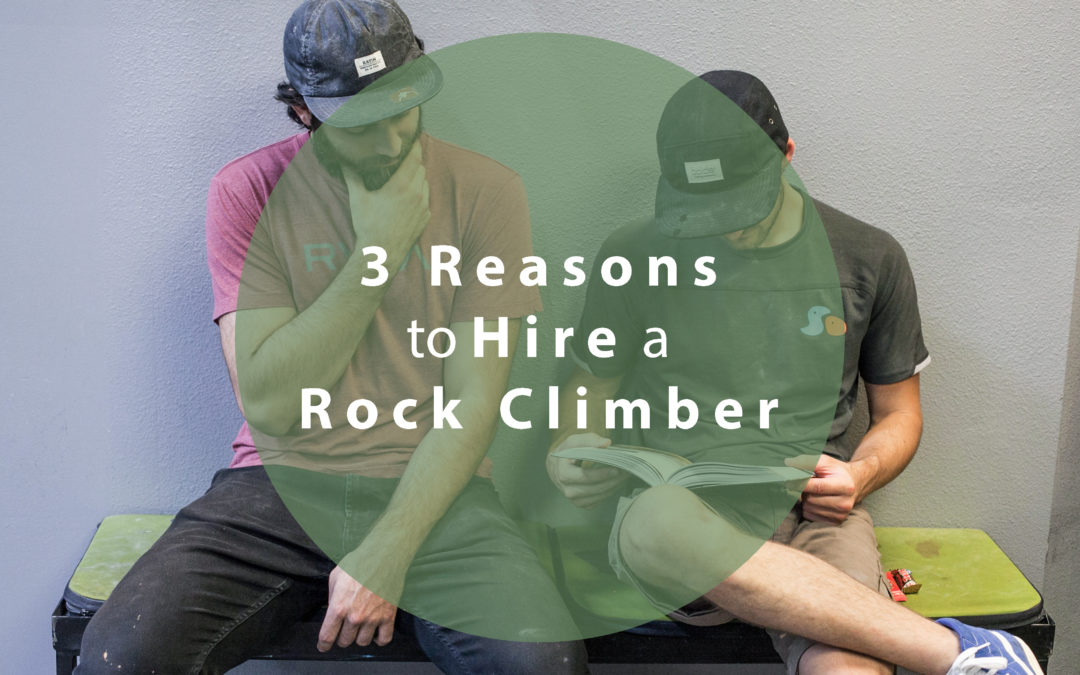Words and photos by Martha Jane Peters
Alex Honnold and Chris Sharma can climb for a living, but most of us have to do something else to put food on the table. And most of our employers would rather us spend more time in the office and less time rock climbing. What they don’t know is that climbing is a great way to develop the soft skills needed to succeed in the workplace. Here are 3 (of the many) reasons to hire a climber:
Climbers know that succeeding means facing your fear of failure
Recently, I saw a Facebook job listing that read “We are looking for a slightly impatient individual willing to face down their fear of failure to accomplish bold things.” If I were to apply for the position, I could probably come up with some examples of my willingness to face down fear of failure from my cubicle. But they wouldn’t be as compelling as the lessons that I’ve learned through climbing.
Every person who makes a habit of climbing has probably faced their fear of failure at one point or another. When you first start climbing, you may be afraid of being unable to finish any difficult grades. On your first day, you might not make it up anything at all. To progress, you have to be persistent and consistent. You have to be willing to walk up to the bottom of that project you’ve failed at every day for 6 weeks and give it your all one more time. Because who knows? Today may be the day you send your project, climbing or career-wise. Climbers know that the sweetest success is preceded by failure.
Climbers perform under pressure
The University of Southern California’s Marshall School of Business recently pioneered a new program called The Performance Science Institute (PSI). PSI’s mission is to “teach, train, and research the science, best practices, and applied principles for high performance in any domain.”
One of the focus areas for the PSI is understanding performance under pressure. Dr. Glenn Fox, who heads the program, studies neuroscience and teaches “The Science of Peak Performance.” When asked if he could have anyone in the world come speak at USC, his response was Alex Honnold. In Fox’s mind, Honnold’s free solo ascent of El Capitan is the ultimate lesson in performance under pressure. In fact, on February 1, 2018, USC hosted Alex Honnold at a special event for business students and the public.
Climbers like Honnold develop strategies for coping under pressure that allows them to succeed in high-stress environments. It says a lot about the sport that USC’s business school is studying those strategies to share with business students and leaders.

Face your fears! Failure is not getting back up after you fall.

Multi-pitch in Tahquitz
Climbers plan ahead and communicate
Ok, smart climbers plan ahead and communicate. If you’re on a multi-pitch climb and your partner is going to link the last 2 pitches so that you can finish before sunset, there could be 150 feet between the two of you when he/she finishes the second pitch. You need to plan for that. What if you can’t hear them yell “off belay?” What’s the signal to start climbing?
Smart climbers plan ahead and prepare. They know about the route they’re climbing, and they’re ready for contingencies. Sometimes – in climbing and at work - you have to improvise in the moment. Solid preparation and communication are the skills you need to do that effectively.
At first glance, scaling 600 foot walls for fun doesn’t seem like good cross training for a career in investment banking or engineering. But take a look around Sender One LAX on a weeknight and the number of SpaceX t-shirts suggests otherwise. Maybe Elon Musk is on to something.

